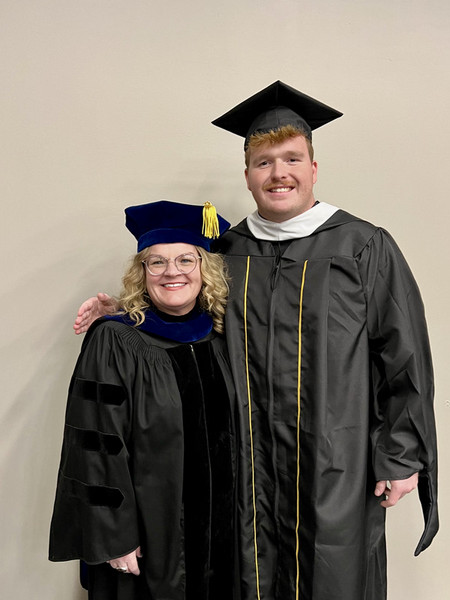
by Dr. Andrea Stark Bishop, director of the Center for Leadership and Development
In college sports where noise and flash often command the headlines, true leaders reveal themselves through consistency, resilience and a steady commitment to excellence. For the past few years, Bison quarterback Cole Keylon has embodied leadership on the field and in his studies.
If you haven’t followed NCAA Division II football over the last several years, you may not be familiar with the name Cole Keylon. For those who know the Harding Bisons’ recent playoff history, I’m confident you know the name and the reputation. But this is not an article about football. This is an article about leadership — about a smart, capable graduate of a Master of Arts in organizational leadership program.
I’ve been teaching in higher education for more than 20 years, so Cole is certainly not my first student-athlete. He’s not even my first incredibly successful student-athlete or the first to show me a fierce dedication to studies as well as sport. However, he is the first student-athlete to invite me to hood him at a special commencement ceremony for football players the night before the NCAA Division II National Championship game.
A week before the championship, I received a text. Cole wanted to be hooded. A hooding ceremony is a special part of the graduation experience for students completing graduate programs. More than just crossing a stage, the hooding symbolizes the placement of knowledge on the shoulders of the grad. To be hooded is to accept the responsibility that comes with sharing and growing that knowledge. Cole wanted to be hooded, but he didn’t want to inconvenience me. He texted, “But I don’t want to put you through the travel for just one person.” His complete lack of entitlement and his authentic humility didn’t surprise me. I’d come to know Cole over the last few semesters, and that same humility had been present in every discussion and assignment.
Of course, I absolutely traveled to McKinney, Texas. I was honored to be there for him — honored to help him celebrate not just a successful football season and a big game, but to celebrate the completion of an impressive educational milestone. At 23 years of age, he had completed a Master of Arts in organizational leadership with a concentration in training and development. While working on his football career, he had also been steadily completing coursework, including major projects with detailed plans for crisis communication, organizational change, community engagement and training packages for a variety of topics. He exemplified the student in the student-athlete title.
Todd Miller, my colleague and a professor in the MAOL program, talks about Cole’s toughness on the field and his engaging, approachable personality off the field. Miller says that Cole has “a natural charisma and a sense of humor that is contagious and brings people together.” I must agree with this. In person and in his online discussion forums – often with fellow students often twice his age – Cole was a thoughtful and often witty presence.
While that final game didn’t end the way that Cole wanted it to end, the way he carried himself and led his team showed grace, resilience and an unwavering commitment to be the type of leader who earns the respect and admiration of those around him.
I’ll teach other student-athletes throughout my career who will impress me in a variety of ways, but I may never have another star quarterback of a national championship-level team worry about inconveniencing me when asking me to hood him. That humility is just part of what makes Daniel Cole Keylon a special leader with a bright future ahead.